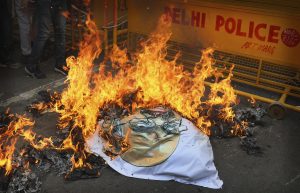The U.S. Commission on International Religious Freedom (USCIRF), a government watchdog that focuses on religious freedom around the world, designated India a “Country of Particular Concern,” or its lowest rating, in its annual report for 2020.
The recommendation by the body for India was justified on the grounds that the Indian government had allowed “campaigns of harassment and violence against religious minorities.” The report is the first to come after a particularly contentious 2019 in India, where the government signed into law a controversial citizenship act and the country’s Supreme Court ruled on a controversial case concerning the fate of the Babri Masjid site.
Both developments were noted by the Commission. “Throughout 2019, government action—including the CAA, continued enforcement of cow slaughter and anti-conversion laws, and the November Supreme Court ruling on the Babri Masjid site—created a culture of impunity,” the report’s section on India notes.
The report also highlighted the controversial National Register of Citizens (NRC) in India. “The BJP-led government enacted the Citizenship (Amendment) Act (CAA)—a fast track to citizenship for non-Muslim migrants from Afghanistan, Bangladesh, and Pakistan already residing in India—and approved a National Population Register (NPR) as a first step toward a nation-wide National Register of Citizens (NRC),” the USCIRF report noted.
“During 2019, discriminatory policies, inflammatory rhetoric, and tolerance for violence against minorities at the national, state, and local level increased the climate of fear among non-Hindu communities,” it added. The report referenced the outbreak of Hindu-Muslim violence in Delhi in February 2020, in which over 50 people were killed.
The USCIRF has no power to enforce its findings and recommendations, but the U.S. Department of State takes its findings into consideration in shaping U.S. ties with a particular country. One of the report’s recommendations to the U.S. government is that the United States should “impose targeted sanctions on Indian government agencies and officials responsible for severe violations of religious freedom by freezing those individuals’ assets and/ or barring their entry into the United States under human rights-related financial and visa authorities, citing specific religious freedom violations.”
USCIRF reports have previously generated tension in the U.S.-India relationship, which remains otherwise strong owing to a broader strategic convergence between the two countries amid China’s rise.
Indian Prime Minister Narendra Modi was not given a U.S. visa in 2005, allegedly due to concerns over his complicity in the 2002 riots in the Indian state of Gujarat, where he was chief minister prior to taking the prime ministership in 2014. As recently as 2013, the USCIRF recommended that Modi remain under a visa ban.
The Indian government pushed back on the latest USCIRF report. “We reject the observations on India in the USCIRF annual report. Its biased and tendentious comments against India are not new. But on this occasion, its misrepresentation has reached new levels. It has not been able to carry its own Commissioners in its endeavor. We regard it as an organization of particular concern and will treat it accordingly,” a spokesperson for the Indian Ministry of External Affairs said in response to the latest report.
The other countries listed as “Countries of Particular Concern” in the 2020 USCIRF report include China, Eritrea, Iran, Myanmar, Nigeria, North Korea, Pakistan, Russia, Saudi Arabia, Syria, Tajikistan, Turkmenistan, and Vietnam.

































